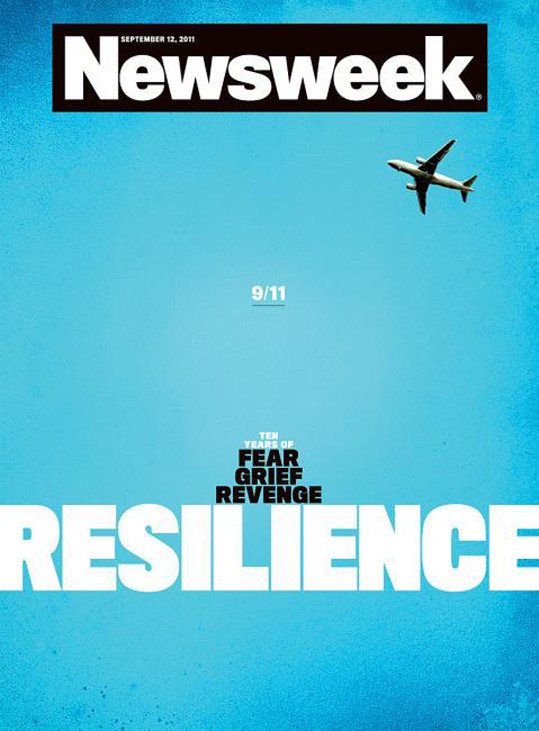The Study of History Should Give Us Pause in Contemplating 9/11
The cover of the September 12 Newsweek shows a solitary plane in the kind of spacious blue sky we praise in "America, the Beautiful." On this background in white letters we read: "9/11 Ten Years of RESILIENCE." Three words in black, "FEAR GRIEF REVENGE," are placed vertically above the much larger word "RESILIENCE."
This image conveys one take on a national moment of suffering and how we have lived through ten years of history in reaction to it: the color-coded dark emotions of fear and grief fueling the equally dark human instinct to take vengeance. The Newsweek editors believe what we ourselves want to believe about what we have been through and where we are now. We are resilient. We have bounced back to where we were before.
I think all Americans have their own ideas about where we stand a decade after 9/11. Our opinions probably differ about whether we took the right paths as individuals or as a nation. Rather than discuss such potentially polarizing matters, I want to make some observations on how we use history and historical memory to deal with tragedy and the grief that stems from it.
It is a tricky subject. A senior honors thesis student, Abraham Callahan, recently asked me why Thucydides, the father of scientific history, had bothered analyzing the motives and causes of mass killings of human beings in civil wars and political revolts. Thucydides asserts that human nature is constant and will lead to such things happening again, presumably no matter how much history people have read.
Fortunately, intelligent human beings, from the Greek soldier-playwright Aeschylus to leaders of our nation after the assassinations of John F. Kennedy and Martin Luther King Jr., have thought about the nature of collective grief after violent public acts, where our emotions want to take us, and what happens if we let them take us there.
One way we might confront an atrocity like the Holocaust is by placing it beyond human understanding. Claude Lanzmann, whose long documentary about the Holocaust, Shoah, focuses on personal testimonies from witnesses, does this, quoting the response of an SS guard at Auschwitz to Bruno Levi. Levi had broken off an icicle to slake his unbearable thirst. The guard took it away. Levi asked, "Why?" The guard replied, "Here, there is no ‘why.' "
The assassinations of John F. Kennedy and King take us back to early Greek thought through the mind of Robert F. Kennedy. He spoke to a crowd in Indianapolis on April 4, 1968, the day King was assassinated. Many African Americans were there. Kennedy's heartfelt words are worth hearing:
In this difficult day, in this difficult time for the United States, it is perhaps well to ask what kind of a nation we are and what direction we want to move in. For those of you who are black and are tempted to be filled with hatred and distrust at the injustice of such an act, against all white people, I can only say that I feel in my own heart the same kind of feeling.
I had a member of my family killed, but he was killed by a white man. But we have to make an effort in the United States, we have to make an effort to understand, to go beyond these rather difficult times. My favorite poet was Aeschylus. He wrote: ‘In our sleep, pain which cannot forget falls drop by drop upon the heart until, in our own despair, against our will, comes wisdom through the awful grace of God.'
By spring 1968, Kennedy had more than four years to figure out how to live with the killing of his brother. He decided to stay involved in politics, and he dedicated himself to furthering the goals in domestic and foreign policy that still constitute his brother's legacy.
The responses of Kennedy and Aeschylus give us no "why." But they tell us that immersing ourselves in grief will cause pain, and that the pain, pondered in our minds and hearts over time, might lead to wisdom. If these great men were here today, they might ask us, "Have you found wisdom yet? Have you chosen your paths wisely? Where will you go now?"
